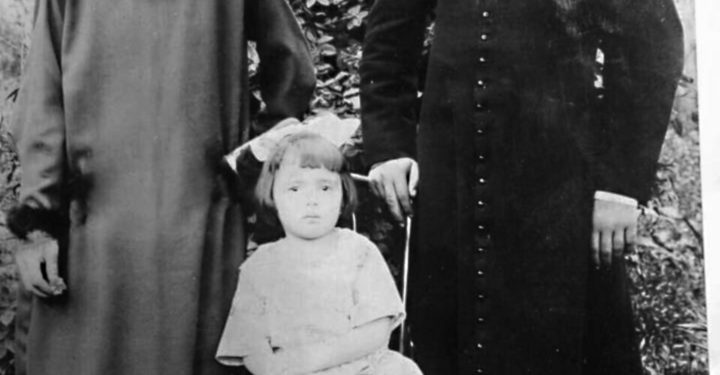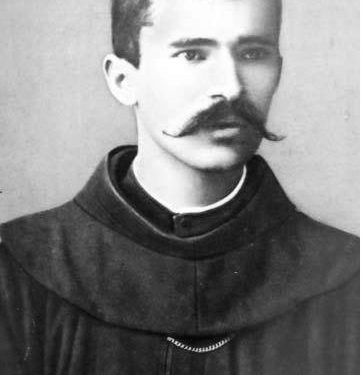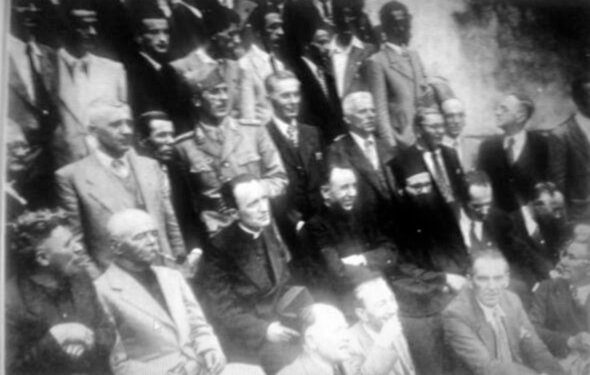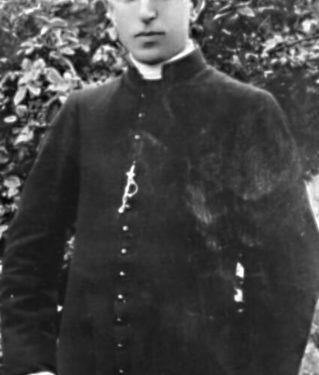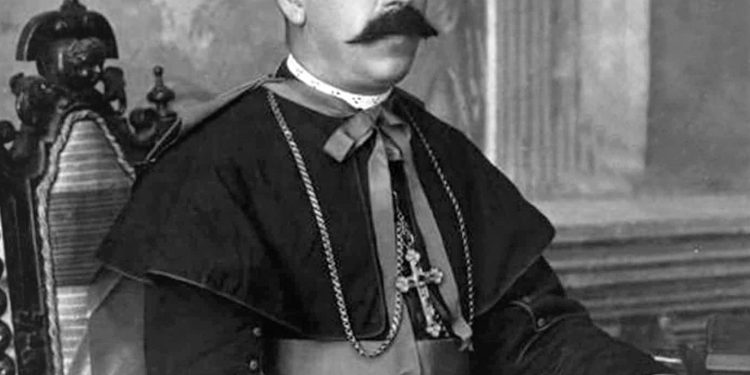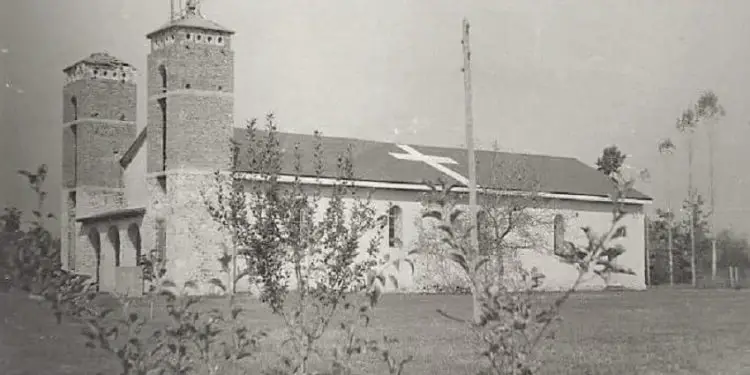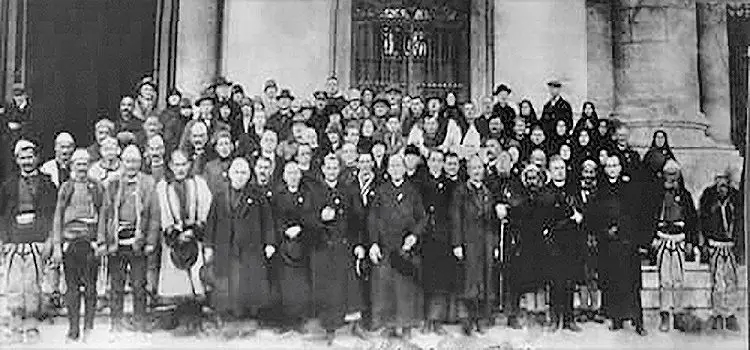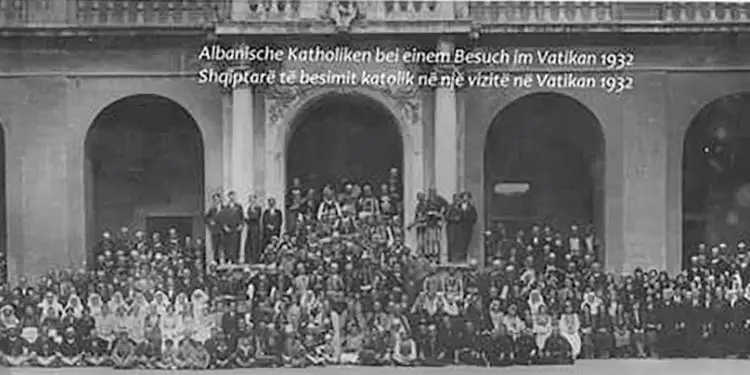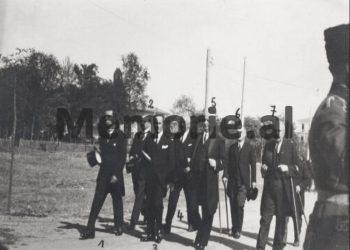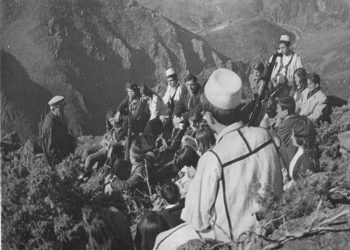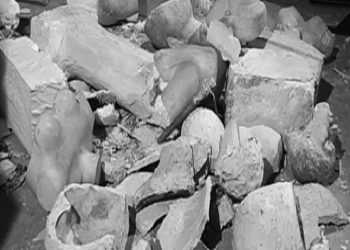NIKOLLË LOKA
ALFDRED DUKA
NIKOLIN KURTI
Second part
WHY DOES THE POLITICAL ACCUSATION OF COLLABORATION NOT STAND?
-Continuing the tradition of native Catholic clergy –
Continues from last issue
Memorie.al/ Archbishop Prenushi had talked with the Italian missionary priest Santi and after that conversation, he found that Dom Shtjefni had only maintained official relations with him, while directly expressing his opinion on spiritual rapprochement between the clergy of Archbishopric, as and the task he held demanded it.
In letter No. 74/42 dt. 1-20-1942, Monsignor Prenushi replied to parish priest Kurti, in a very softening and somewhat justifying tone: “… By chance I spoke with P. Santi, and I voiced the complaint that you sent me in a letter to highlight. From the development I received, it seemed to me that this matter had been fixed for a long time, I discussed the matter between you, since you yourself get along so well with P. Santi, this work makes us very happy, why you didn’t tell me, until where it can be done, file complaints against each other….”!
Dom Shtjefni had burned the stages and had not talked with the Italian missionary, because apparently harmony with the Italians, whether clerics, was not his primary goal, but the implementation of the rules. It was not the first time that the clergy and nuns of Italian nationality sought to manifest independence from the Albanian parishioners. Dom Kurt’s coldness and pedantry had caused the Italian clergy to try to avoid him. Thus, with the intervention of the Italian clergy of the Jesuit Fathers, Dom Shtjefën Kurti is not included in the protocol of the ceremony for the birthday of the King of Italy and the official “Te Deum” of the Catholics of Tirana, which was held in the private church of the Jesuit Fathers, without any knowledge and his consent, while that ceremony should have been asked and performed with his consent. Kurti protests against his exclusion, stressing that this action causes “jump, division and scandal”. But, understanding well the labyrinths of politics and its secrets, he does not address the Italian authorities nor the Apostolic Nuncio, but the Albanian Prime Minister:
We submit to Her P.T. The Prime Minister, our complaint that too much was done during various celebrations, did not call representation from the Catholic Clergy. This work puts our Community on a lower level than other Communities and may be interpreted badly by the Authorities.
Therefore, I am begging you, P.T. Prime Minister, with the kindness to take care of whom you are begging so that these events are not confirmed anymore.
Tirana, January 29, 1939
With our respect
The parish priest
Don Shtjefën Kurti
Apparently, this omission made an impression on the Albanian circles, which were attentive to it, with or without the intervention of the Prime Minister. The Deputy Mayor of the Municipality, Ali Erebara, had also written to him about an incident that had happened to Dom Shtjefni, with the arrival of the King of Italy, Victor Emmanuel, when the crowd of curious people had blocked his way and he had not been able to follow the activity normally.
Even after the capitulation of Italy, the practice followed by the administration under the German occupation did not differ much from that under the Italian occupation, because most of the officials were the same. In some cases, the state authorities included the Parish of Tirana in the holiday program and in some cases, they ignored it. On the occasion of the 31st anniversary of independence, the parish priest of Tirana had the program of the Independence Day celebrations. On November 26, 1943, the Prefecture of Tirana wrote to Dom Shtjefni that, in the national holiday of November 28, 1943, the Catholic Church was also involved.
Royal Prefecture Tirana 26.XI.1943
Albanian No. 5293/5
Sincerely, Tirana Catholic Parish
Attached we send you a copy of the program for the celebration of the XXXI anniversary of the National Independence, with a request that you approve the implementation of the provisions that apply to you.
Voice Prefect
Lutfi Shehu
Before he was ordained a priest, the Rector of the College, Monsignor Paolo Giobbe, now a Cardinal, seeing that he had too nationalist feelings, advised him not to adapt to the Archdiocese of Skopje (Yugoslavia), but advised him (after D. Shtjefni had insisted on going in Ardidječez in Skopje, to serve the Albanians), so that he could go to Boston (USA), and there he could take care of the good of the Albanians. But Don Shtjefni did not listen, he urged him to be ordained a priest for the Archdiocese of Skopje. And so it was.
In July 1921, he went to Kosovo, after staying a few days in Ferizaj with his family, he presented himself to his Ordinary, Monsignor Lazer Mjada, Archbishop of Skopje, with residence in Prizren. Monsignor Lazer Mjeda named him parish priest of Novosella, a fraction of Gjakova Parish, but after a month he stayed with him in Arqipeshvi, he said: “You will be my Secretary”. Even so he acted and worked with them as long as he stayed in that Archdiocese. In the fall of 1921, Imz. Lazer Mjeda, named after the Holy See of Arqipeshev of Shkodra. Tue left the Archdiocese of Skopje for Rome-Shkodër, Don Shtjefni with him.
On his way to Rome, at the beginning of December 1921, Monsignor was received in audience by Pope Benedict XV. After working with the Pope, he also called D. Shtjefni to the Pope, who asked him where he studied and when he was a priest. – He answered that he had completed his studies that same year in Rome and that he was an ex-alumo of the College of Propaganda Fide, and that from you, before leaving for your Mission in the Archdiocese of Skopje, in a private audience that the Cardinal of Propaganda Fide Gulielmo Van Rosum had behind him, who accepted in the audience that he had behind him a precious gift, a good cross, like that of the bishops who carry in the belt.
The Pope welcomed these words and said: “I am giving you permission to leave the Archdiocese of Skopje and go with the Archdiocese of Shkodra, and to continue being the Secretary of the Archdiocese”.
Don Shtjefni thanked him and told him that he wanted to return to the Archdiocese of Skopje and work for that population of the country.
The Pope was very pleased with this answer and said: “Okay, go back and work with that people”; spent the morning together with the Archbishop, His blessing, the duel from His studio. How a few days passed, while they were still in Rome, since Pope Benedict XV died?
They meet without the name of the new Pope.
How was Pope Card named? Ratti, who took the name Pio XI, Monsignor Mjeda and Don Shtjefni were the first in audience with the new Pope, who received them in the Conclave cell; he hugged them in Albanian, and blessed them, after they had finished their work with him. Monsignor Mjeda, surrendered to the Archdiocese of Shkodra, probably in February, accompanied by D. Shtjefni. D. Shtjefni, after staying in Shkodër for almost a month, went to Bari, where he met Luigj Gurakuqi, and was seen with him for a few days in Venice-Vienna, together with Imz. Luigj Bumçin, whom the Prime Minister of Min. P. Within Shqipnis, Ahmet Zogu had left Shqipnis.
After 4 months he returned to his Archdiocese. Deputy Arkip. of Skopje, Monsignor Tomazo Glasnović, told him to go and help Don Simon Gjokić in Prizren. There he organized the Catholic youth of Prizren with a dry orchestra. Don Simon didn’t like this: he says that the youth with the orchestra is deafening me.
In the autumn he went to Gjakovë, with the title of Parish Priest of Novosella. From Gjakove, I serve my own parish, which had neither a cell nor an elder where I could say Mass. In 1922, Pashkesh went to Novosella, gathered the people and told them that he wanted to come and live in Novosella. So he asked for a room for rent. Katundi gave him a room in Ndue Gjoka’s tower. There, in that room, he received the believers, cooked, slept, massed and preached.
On the roof of the house he put a bell, with which he used to announce mass to the people. That same summer, he started working on the construction of the parish. Within the year enter a new cell.
He founded the parish of Novosella from the parameters, kelshej and everything. He later founded the Congregation of Our Lady, and the Youth Society “God is with you and with your soul”. (This is how the youth of the Novosella parish greeted them). Formed the chorus, suell harmonium. Monsignor Mjeda told him to go to Shkodër, assistant parish priest of Pjetër Gjura, but Don Shtjefni did not accept it. He enriched the parish with arable land, meadows, orchards, and other gardens. I pray to my parish and the entire Albanian population of that sub-prefecture against the injustices, persecutions and torture inflicted by the Yugoslav authorities. Twice he went to Belgrade, to protest to the government about the injustices inflicted on the Albanian population regardless of religion, of that sub-prefecture.
Ahmet Zogu, when he fled Albania, found a place in Belgrade. At that time, the gendarmerie of the sub-prefecture of Gjakova beat and drowned some Albanians. In the village of Doblibare, there were several deaths from the uncle. Don Shtjefni was angry. The day this happened, he left for Belgrade and sent a written report to the Ministry of Internal Affairs, asking them to send an inspection to the country to verify the incident. At the same time, he went to visit Zogolli at the Bristol Hotel where he was staying. He handed him a memorandum on the situation of Albanians in Kosovo, a manuscript of approximately 300 pages.
The gadi told the content in words, we missed him, he was disgusted by the knowledge. The memorandum ended with these words: “You are trying for Albania, but remember that half of Albania is your captive, what I wrote above”.
(One of these words was repeated by Zogu in 1930, in January, to D. Shtjefni, when he crossed the border of Yugoslavia and came to Tirana, and was in his audience. He said to him: “You are Don Shtjefni, who in Belgrade gave me a memorandum on the situation of Albanians in Kosovo? I remember all of them, especially the last words”.
The Yugoslav government sent to the place where the people were beaten, for whom Don Shtjefni had complained, and how many of them had found death, but to no avail. No one had dared to confirm what D. Shtjefni had deposited in the Ministry of Internal Affairs in writing.
His position was bad enough. He went back to Zogu and begged him to intercede: He begged him to ask the Government to change the Prefect of Peja, the Sub-Prefect of Gjakova and the Post-Commanders of the Post Gendarmerie of the Sub-Prefecture of Gjakova; and then send an inspector to prove what he complained about. And so it was done, and the inspector, the villagers confirmed what he had deposited. The discovery of the graves of those who died from the uncle was made, and what was complained about in the report was confirmed point by point. He returned happily to Novosella, but immediately noticed that the authorities looked at him with a bad eye. What’s more, Montenegrin teachers, who were near any Albanian house, were installed on their lands. Naturally for them, it was that eye that they wanted to witness what was happening among his Catholic and Muslim compatriots. Someone from the authorities of the Subprefecture, after the murder of Father Shtjefën Gjeçov, had given him a letter to read, ordering him to track him down. The clerk, whose name is Jovan, told him: “I have nothing to do with you; you are on the black list.”
The head teacher of the school in Novosella filed a lawsuit against you in the courts, accusing you of taking your servant from house to house, advising them not to take their children to the Serbian school. Such a thing was not true, but the truth was that D. Shtjefni taught them Albanian, and gave them Albanian books.
You saw that the work was getting thicker day by day, with your two friends, Don Luigj Gashi and Don Gjon Bisak, escorted by Pashuk Biba, Mark Berisha, and Frano Sokol’s family, they hiked and fought on the border of Shqipnis at midnight, when the day of January 2, 1930 was beginning, at pyramid 11, Letaj.
Then, after immediately sending a telegram to Zogu, you asked for the hospitality of Shqipnis, by your order, they were forwarded to Krumë, Kukës, Bicaj-Peshkopi and Tirana. Still not finished, the newspapers had written more than once about their passage to the Albanian land. On that day, they prepared the Memorandum that they wanted to submit to the League of Nations in Geneva. In April, after they had worked it out and translated it into French, they left for Geneva. As soon as they arrived in Geneva, the Macedonians-refugees were surrounded the next morning at the “Suisse” Hotel, where they were staying.
On May 5, 1931, they submitted to the Secretary of the League of Nations, Mr. Enrih Drumont, their memorandum, with the title: “Situation of Albanians in Yugoslavia”, signed by D. Shtjefni, Don Gjon Bisaku and Don Luigj Gashi. In Geneva, 300 copies of the surrender were distributed to political personalities. Later, they printed the text of the document that they submitted to the League of Nations in 500 copies. They divided them around the world: a) all the Foreign Ministries of the governments that existed at that time; b) Main libraries of the world; ç) the main personalities of the world, etc.
After we returned from Geneva, they paid Zog a visit. He wanted to give D. Shtjefni the decree for any state job he wanted. Don Stejfni, apologized to the honor and added: “Madhni, I am a Catholic priest, I wish to continue to serve the church”. The king went to his feet and took his hand, shook him and said: “I love you and I will always be with you. For every need you have, bring me.”
In the fall of 1930, Archbishop Gjura appointed him parish priest in Shna Prende of Kurbin. A week before the Sums, the parish was surrendered. The building was completely destroyed by the ruling people of the church. Monsignor They said to him: “Don Shtjefen, you are a little strong, look, I have already taken the long lands of the church, under your rule.” “I will try”, he answered. As soon as he reached the parish, the boy who had the church goats (approximately 100 pieces) was leaving Shna Prenden to go to Zheja, he was where he wanted to be and handed over the church goats to the parish of the village.
Don Shtjefni said to his father: “The goats belong to the church, bring them here in the sheepfold”. He did as Don Stephen told him. Then Don Shtjefni gave the goats to whoever he wanted. As soon as this work was done, the village party gathered around you; they asked him to deliver the goats to them. Don Shtjefni replied: “Go to the Archbishop, he wrote me a letter and gave it to them, I obey the order.” The work went on until one of them, named Ndrec Pjetër Mark Balozi, raised his rifle. Don Shtjefni did not bow down. Vojta went to the Archbishop, and received this answer: “I don’t interfere with the vicar, don’t be angry with him, because he takes the work to Rromë”.
There and today (at least, as long as Don Anton Zogaj has been in Shna Prende), the priest has placed the living thing and the land, without disturbing the village. Dom Shtjefni removes the abuse of blessed water. It was a custom that the priest brought home the blessed water to each family. He who was the first to start going from house to house (and this work continued for more than 2 weeks), blessed the houses of the villages of the Parish, on the occasion of the Feast of the Blessed Water.
I don’t listen when they say mass to the factions on the second and third days of Lent and Easter and other celebrations, if they don’t come to the parish church on the first day of the great feasts. Common fractions on all Sundays and holidays of Bani Skuraj. As far as Shna Prende was concerned, it was the month of May. Also build new cemeteries. He found many objections, but he succeeded in the end. He reconciled several builders and immediately repaired two rooms and a kitchen as best as possible. Those three rooms meet like in the city, and according to your taste.
Talked with the Apostolic Delegate De la Pietra, to take into our hands the most suitable building for the Villagjatur of the priests of the Papnuer Seminary. On the second day of Lent in 1930, the Apostolic Delegate and Father Steccati, Rector of the Seminary, came to the cell. They looked at the place, the house and everything. They really liked Don Shtjefni’s opinion. It was said that he thought he could complete all the works at the expense of approximately 400 Napoleons. In the spring of 1931, he went to work. It was good luck for the locals, because the grain was very flat, so they had the opportunity, big and small, to earn the lek for as long as the works lasted. At the time of summer vacations, young men come to Shna Prende.
In 1932, at the Synod, Rev. Gjura proposed to him, we talked separately, that he would agree to go to Gurëz and establish the parish of Gurëz “ex novo”, since it was previously administered by the parish of Milot. He said: “Yes, he went.” In the Synod he proposed and appointed him. On September 28, 1932, he landed in Gurëz. There was a sound room, which was divided into half by boards with the lead area, by a certain Ndue Gjokë Troshani (he is still alive in Gurëz). Also in the yard, a chapel, where he used to say mass on working days. On Sundays, he used to go to church where he is today, he would mass in a granary that had the Austro-Hungarian (pig) coup. Temporarily attached to that shack a good hatch to the wall, which communicated with the shack. The people were surprised. Memorie.al
The next issue follows




